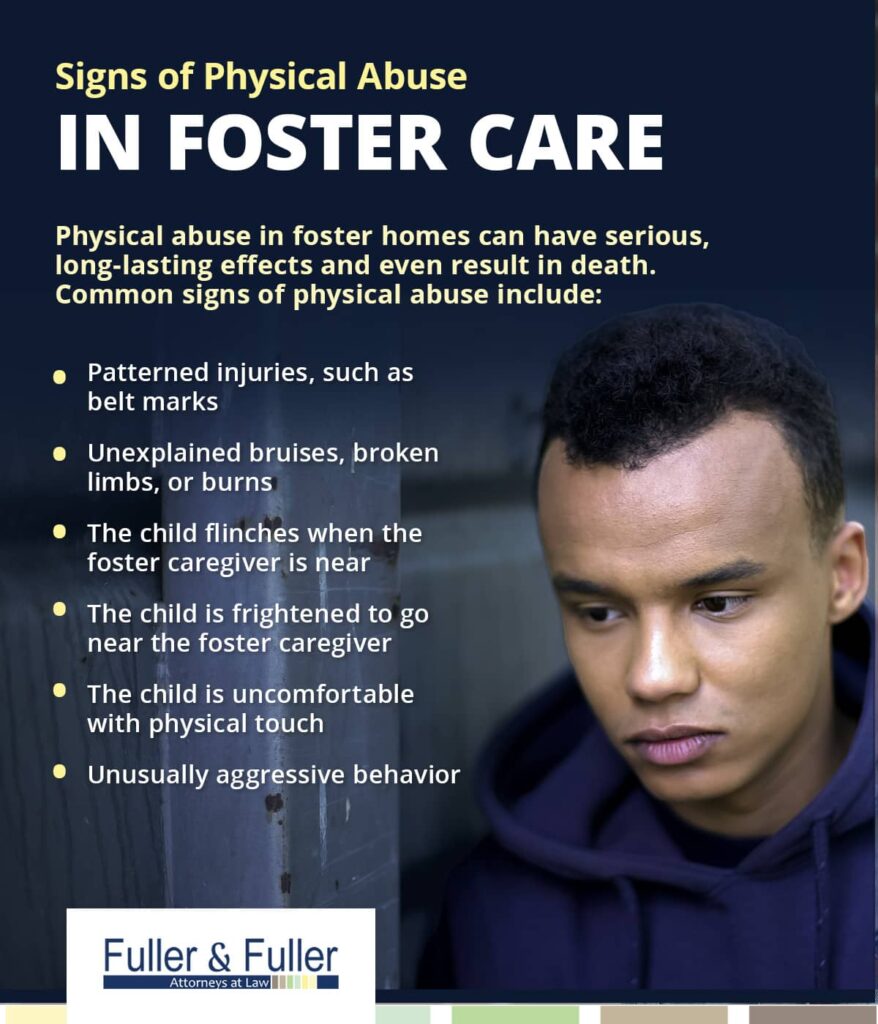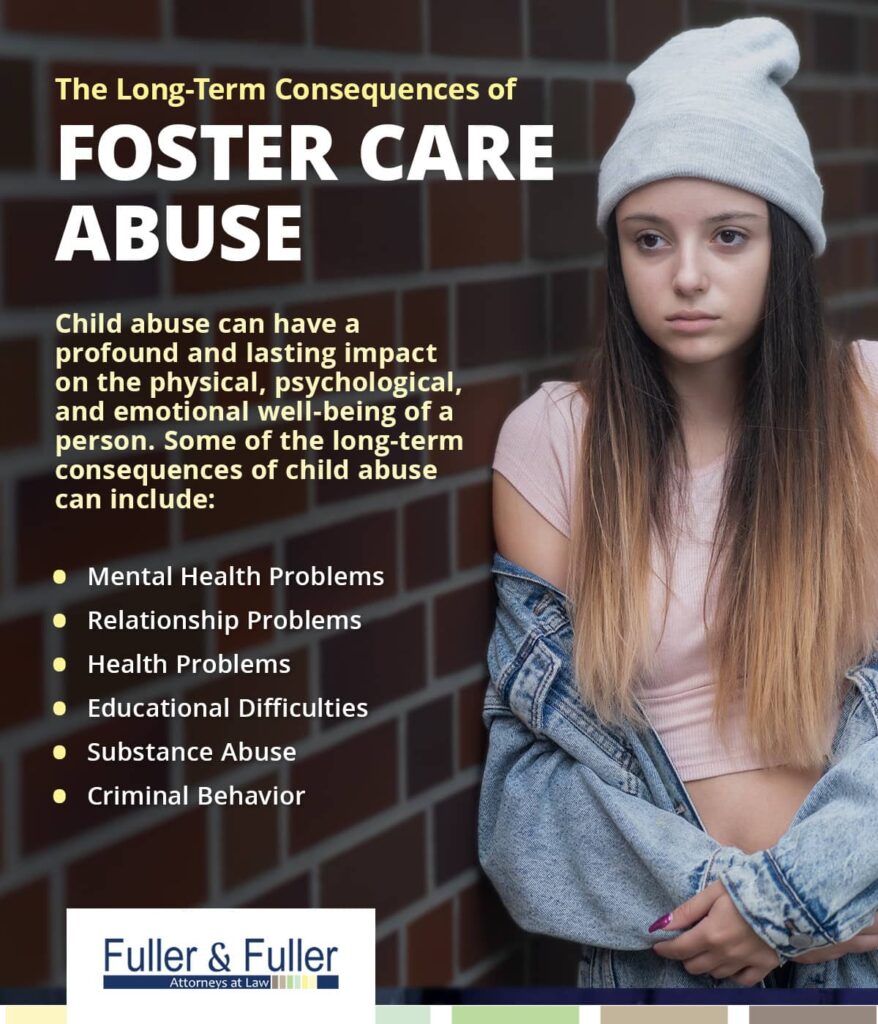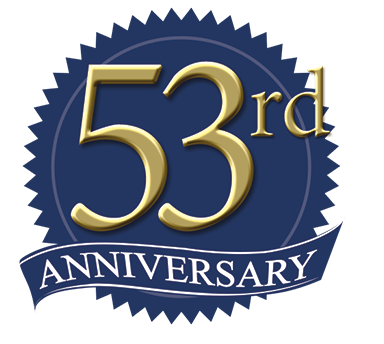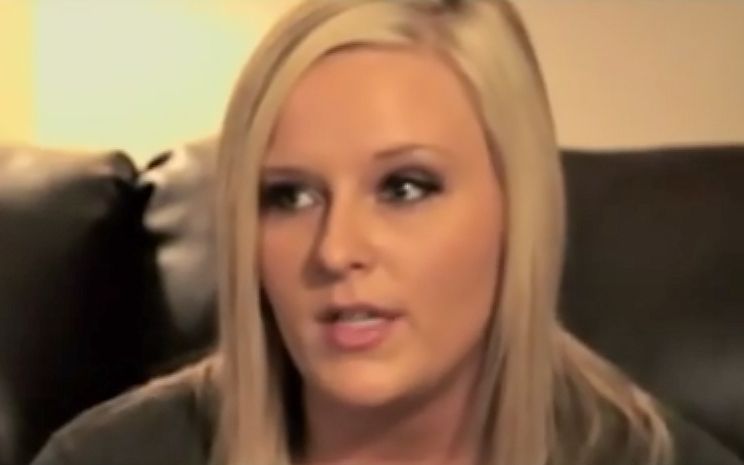Foster Care Abuse and Neglect Attorney Serving Olympia, Tacoma, Seattle & Nearby Areas of Washington
Foster care abuse lawyer Marya Fuller is an advocate for children harmed in the foster system. She is committed to helping survivors of foster care abuse throughout Washington.
In 2020, there were 407,383 children in the U.S. foster care system. A 2013 report by the United States Department of Health and Human Services (HHS) stated that approximately 90% of children in foster care are exposed to trauma. These highly vulnerable children deserve to live in environments that are nourishing, fulfilling, and free of abuse.
If you know a foster child who has been abused or neglected, or if you were abused as a foster child, contact Fuller & Fuller, Attorneys PLLC now, either online or at (800) 570-4878. We handle foster care abuse and neglect cases on a contingency basis, so there is no charge for our services unless we win the case. We welcome clients from all of Washington, including Olympia, Tacoma, Seattle, and other areas.
Cases can often be brought for many years – even decades – after the abused children become adults. Call or contact Fuller & Fuller, Attorneys PLLC, even if the abuse happened long ago.
Often legal action is also possible If the abuse happened in a group home for children, and not in a foster home. If you were victimized in a group home, please call today or contact us online.
There have been many large dollar settlements of cases against the State of Washington. Those settlements occur because the State knows that it frequently failed in its duty to protect foster children. If you are one of those children who was abused in foster care or a group home, please call us to find out if you have a claim.
What Is Foster Home Abuse and Neglect?
RCW 26.44.020 defines abuse and neglect as:
“sexual abuse, sexual exploitation, or injury of a child by any person under circumstances which cause harm to the child’s health, welfare, or safety, excluding conduct permitted under RCW 9A.16.100; or the negligent treatment or maltreatment of a child by a person responsible for or providing care to the child. An abused child is a child who has been subjected to child abuse or neglect as defined in this section.”
Children in foster care are at a high risk of experiencing abuse, neglect, injury, maltreatment, and sexual assault from foster caregivers. However, victims of foster care abuse often do not report their abuse, and lawmakers cannot always protect them. It is important that we advocate for the rights of these vulnerable youth and fight for the justice they deserve.
Types Of Foster Care Abuse
Physical Abuse
Physical abuse is one of the most common forms of child abuse. It occurs when someone deliberately commits an act that results in physical injury to a child, such as broken bones, muscle sprains, bruises, welts, cuts, or red marks. These injuries can have serious, long-lasting effects and can result in death.
Signs of physical abuse include:
- Unexplained bruises, broken limbs, or burns
- Patterned injuries, such as belt marks
- Unusually aggressive behavior
- The child is uncomfortable with physical touch
- The child is frightened to go near the foster caregiver
- The child flinches when the foster caregiver is near
Sexual Abuse
Child sexual abuse refers to any sexual behavior involving a person under the age of 18, as minors are unable to give consent. There are two forms of sexual abuse: physical and non-physical. Exposing one’s intimate parts to minors or taking sexually explicit photos of them also constitutes child sexual abuse.
Other acts that are considered child sexual abuse include:
- Rape or sodomy
- Drug-facilitated sexual abuse
- Sexual coercion
- Sexual assault or battery
- Child molestation
- Kissing, groping, stroking, or sexually touching a minor
Signs of sexual abuse include:
- Sexually transmitted infections (STIs)
- Signs of trauma to the genital area, such as unexplained bruising, bleeding, or blood on underwear, sheets, etc.
- Complaints about pain in the genitals
- Trying to avoid removing clothing to change or bathe
- Excessive knowledge of or talk about sexual topics
- Sexual behavior that is inappropriate for the child’s age
- Keeping secrets
- Talking less than usual
- Not wanting to be left alone with certain people or being afraid to be away from primary caregivers, especially if this is a new behavior
- Regressive behaviors or resuming behaviors they had grown out of, such as bedwetting or thumb-sucking
- Overly compliant behavior
- Spending an unusual amount of time alone
Emotional or Psychological Abuse
A child may be subjected to emotional abuse if he or she displays sadness or exhibits extreme behavior, such as excessive aggression.
It is especially concerning if the child has attempted suicide or lacks attachment to their foster guardian or social worker. These are strong indicators of emotional abuse.
Conversely, if a foster caregiver regularly humiliates, diminishes, or unjustly blames the child, this may be a sign of emotional or psychological abuse.
Signs of emotional or psychological abuse include:
- Socially withdrawn
- Extreme behavior (too angry, too compliant, too passive)
- Low confidence and not friendly toward other children
- Poor self-esteem
- A change in eating habits
- Poor performance in school
- Excessively scared of making mistakes
Neglect
The well-being of a child can be compromised even in the absence of physical abuse. Victims of neglect can suffer severe, long-term consequences. Neglect is the failure to provide for a child’s basic needs such as food, clothing, shelter, medical care, or supervision.
Neglect can include:
- Physical neglect: The child’s basic needs, such as shelter, clothing, or food, are not met – or the child is not properly supervised or kept safe.
- Emotional neglect: The child is not given adequate nurture and stimulation. This could be through isolating, intimidating, humiliating, or ignoring them.
- Medical neglect: The child is not given proper health care. This includes dental care and ignoring or refusing medical recommendations.
- Educational neglect: The child is not given a proper education.
Signs of neglect include:
- Changes in behavior, such as missing school, becoming aggressive, obsessive behavior, etc.
- Signs of self-harm
- Drug or alcohol use
- Being left alone for a long time
- Health and development problems, such as weight issues, untreated injuries, dental issues, etc.
- Poor appearance and hygiene

What Are the Long-Term Consequences of Foster Care Abuse?
Child abuse can have a lasting and profound impact on the physical, psychological, and emotional well-being of a person. Victims of foster care abuse should be compensated for the long-term consequences of foster care abuse. Some of the long-term consequences of child abuse can include:
- Mental health problems: Abused children are more likely to develop depression, anxiety, post-traumatic stress disorder (PTSD), and other mental health conditions.
- Substance abuse: Many people who were abused as children struggle with substance abuse issues later in life.
- Health problems: Childhood abuse can lead to a range of physical health problems, including chronic pain, headaches, digestive problems, and heart disease.
- Relationship problems: Abused children may have difficulty forming healthy relationships and may struggle with trust and attachment issues.
- Educational difficulties: Children who have been abused may struggle in school and may have difficulty reaching their full academic potential.
- Criminal behavior: Some research suggests that people who were abused as children may be more likely to engage in criminal behavior later in life.
It is important to note that not every child who experiences foster care abuse will go on to experience these long-term consequences, but the potential impact of abuse can persist into adulthood and affect a person’s overall quality of life. If you or someone you know was the victim of foster home abuse or neglect, we encourage you to speak with a foster care abuse lawyer as soon as possible.
Failures in the Foster System Can Lead to Abuse
RCW 74.13.100 requires the Washington State Department of Social and Health Services (DSHS) to take appropriate steps to protect children in foster care from abuse, neglect, and exploitation.
There are multiple ways in which the foster care system can fail children, including:
Allowing Unqualified Applicants to Become Foster Parents
The state must ensure that foster parents can offer a secure and stable home for the children in their care. Foster care agencies are obligated by law to fulfill the primary objectives of the system, including placing the child in a suitable home and rejecting unqualified applicants (those with negative background checks or financial interests).
In the event that the state agency fails to thoroughly screen foster families and abuse occurs, the state may face responsibility for any harm to the child.
A Lack of Proper Monitoring and Oversight
The state remains accountable for the child’s welfare even after placement in a foster home. Regular on-site visits, which involve speaking with the child, are necessary to detect signs of abuse. However, due to high caseloads, follow-up visits may be infrequent or not occur at all. When they do take place, they may not be thorough enough to uncover abuse.
Inadequate supervision is unacceptable, and those responsible for this crucial task can make the state and the agency liable for their failure.
Failure To Thoroughly Investigate Claims of Abuse or Neglect
In Washington, Child Protective Services (CPS) is responsible for investigating abuse allegations and must work with law enforcement. When abuse is present, CPS has a legal obligation to promptly remove the child from harm and place them in a safe environment.
Failing to conduct thorough abuse investigations or delaying the removal process when evidence is present puts children in danger and can result in legal accountability for any additional abuse.
Legal Options for Survivors of Foster Care Abuse
Depending on the nature and time of the wrongdoing, victims of foster care abuse have options for holding their abusers accountable. Child abusers and perpetrators of child sexual abuse can be prosecuted under Washington’s criminal law and held liable in civil court.
Filing a lawsuit for foster care abuse against the state of Washington is different from a standard personal injury case due to unique regulations. Washington has specific guidelines for claims against the state, its workers, and its departments. ..
A knowledgeable foster care abuse lawyer at Fuller & Fuller, Attorneys PLLC can provide you with information and guidance.

Can I Hold the Foster Care Agency Responsible?
In Washington state, the Department of Children, Youth, and Families (DCYF) and its employees, contractors, and foster parents may be held liable for foster care abuse.
To determine liability, a thorough investigation would need to be conducted, and the legal responsibility of each entity involved would need to be assessed.
The experienced attorneys at Fuller & Fuller, Attorneys PLLC have helped the wrongfully injured in Washington for more than 50 years. We understand the hardships abuse victims may be facing and we are committed to helping them move forward with dignity and respect. We will thoroughly investigate the facts in the case and work diligently to recover the full and fair compensation to which a victim of abuse may be entitled under the law.
How Can a Foster Care Attorney Help?
Hiring a lawyer for foster care abuse is important for several reasons:
- Legal knowledge: An experienced attorney knows how to handle complex legal issues and can provide knowledgeable and experienced representation for those who have suffered abuse in the foster care system.
- Holding the responsible parties accountable: A foster care abuse lawyer can help victims hold those responsible for the abuse accountable, which can help bring closure and a sense of justice to the victim.
- Compensation: An attorney can assist in pursuing compensation for damages.
- Protecting rights: A lawyer can ensure that the rights of the victim are protected throughout the legal process
The legal process can be complex and difficult to navigate. An experienced attorney can provide guidance and support to ensure the best outcome for the victim. Hiring a lawyer for foster care abuse can provide support and advocacy for those who have suffered from abuse and help them pursue the compensation they deserve for their losses.

Who Can Be Held Liable for Foster Care Abuse in Washington?
In Washington, several different parties might be held liable for foster care abuse or neglect. In some cases, multiple parties may share a portion of the blame. These can include:
- Washington’s Department of Children, Youth, and Families (DCYF)
- Foster Care Agencies
- Foster Parents
When failure on the part of the state or a foster care agency to conduct background checks or check on children and believe them when they tell of abuse, or spot the signs of abuse, or provide proper training results in abuse, those responsible can be held liable in addition to the abuser. The DCYF or a private agency may also be held liable if it fails to investigate or address complaints of foster home abuse. Liability is typically assigned to the parties that failed in their legal obligation to protect the child.
When you are a survivor of foster care abuse, you should explore your rights to hold each individual and institution that failed you to full account. Foster care abuse attorney Marya Fuller is here to help. During the investigative process of your claim, she will carefully and diligently work to uncover all liable parties who have the ability to pay damages, to enable her to hold each one accountable for the damage they have caused.
Can I Report Foster Home Abuse Anonymously in Washington?
Yes. In Washington, you can report suspected foster care abuse anonymously. The DCYF encourages individuals to report any concerns of abuse or neglect, and anonymity is an option for those who may suspect retaliation. You can contact the DCYF’s Child Protective Services (CPS) by calling 866-363-4276 (866-ENDHARM). The line is open 24 hours a day and handles reports of abuse and neglect statewide.
When reporting anonymously, it’s helpful to provide as much specific information as possible, including names, locations, and descriptions of any observed abuse or neglect. All reports of foster care abuse and neglect—anonymous or not—should be taken seriously and reviewed by CPS to determine the appropriate response.
Reporting foster home abuse in Washington can help to protect the victim from additional mistreatment while also providing documentation that could be useful in future civil proceedings. Evidence of abuse from a DCYF investigation can help to strengthen cases seeking compensation for survivors of physical, sexual, and emotional abuse in a foster care or group home setting.
What Evidence Is Needed to Prove Foster Care Abuse?
Proving foster home abuse or neglect requires evidence that clearly links the harm suffered by the survivor to the responsible parties. Useful evidence may include:
- The Testimony of the Victim
- CPS reports
- Police reports
- Medical records
- Photographs of injuries
- Witness statements
Evidence may also include documentation of prior complaints or incidents reported to the DCYF. In some cases, expert testimony from child psychologists or medical professionals may be used to provide key evidence as well.
Compassionate, thorough, and attentive, Attorney Fuller considers investigating claims of abuse to be a vital part of her mission. She is here to listen to your story—even if you have never told anyone else about the abuse—carefully investigate your claims, evaluate the statute of limitations and appropriate exceptions to the general statute, and help you determine how best to seek justice.
What Compensation Is Available for Survivors of Foster Care Abuse?
Survivors of foster home abuse in Washington may be entitled to various forms of compensation, regardless of the survivor’s age. Don’t let the fact that it has been many years since the abuse occurred stop you from contacting an attorney. The statute of limitation may have run on some forms of abuse if it has been many years, but it has been extended for other types of abuse. Call Marya Fuller, Attorney, for advice no matter when the abuse occurred.
Depending on the specifics of the case, compensation may include damages for:
- Medical expenses
- Psychological counseling
- Pain and suffering
If abuse results in permanent disabilities, additional compensation for future care costs may be included in compensation.
You should receive compensation for all of the ways your negative experiences in foster care or a group home have and will continue to impact your life. This can include difficulties maintaining employment, struggles with mental and physical health issues, and other impacts on your comfort, happiness, and prospects.
Seeking compensation for foster care abuse comes with plenty of obstacles. The team at Fuller & Fuller will take time to understand your situation and help you determine which damages you may be entitled to seek. We are here to simplify the process and protect your rights and options while we fight tirelessly for the total compensation you are due.
How Long Do Foster Care Abuse Cases Take to Resolve?
The time it takes to resolve a foster home abuse case in Washington depends on factors including the complexity of the case, the evidence available, the amount of time that has passed, and the cooperation of all involved parties. Some cases take several months to resolve. Others may take a year or more.
It is important to remember that the civil process is different from the criminal process. With the criminal process, the goal is a conviction that results in jail time, fines, and other punishment. With a civil trial, the goal is obtaining fair and full compensation for the damages foster care abuse has done. While the process involves an investigation, case preparation, and negotiations, it is possible to avoid a trial in many of these cases and settle the case. A settlement can speed up the process.
During your FREE case review at our Tacoma or Olympia office, we will carefully review your claim, discuss timelines, and help you understand how long it may take to resolve your case.
What Resources Are Available for Survivors of Foster Care Abuse in Washington?
The state of Washington offers several support services for victims of mistreatment, including:
There are other resources, such as counseling and therapy services through local mental health providers, as well as support groups for children and families affected by abuse.
When you are a survivor of foster home abuse or neglect, having a lawyer on your side who can help you seek compensation is always a good idea. Your lawyer can provide information about local, state, and national resources for survivors of physical and sexual abuse, and be able to direct you toward those that will be most useful.
Contact Our Washington Foster Care Abuse Lawyer Today
If you or someone you know has suffered abuse or neglect in the foster system, we encourage you to contact our foster care abuse lawyer today.
Established in 1972, Fuller & Fuller, Attorneys PLLC has been helping the wrongfully injured in Washington for over five decades. We recognize the traumatic impact abuse can have on a victim’s life, and we are committed to pursuing fair compensation for our clients.
Please call (800) 570-4878 today to discuss your case with a knowledgeable and compassionate member of our team. Foster care abuse attorney Marya Fuller serves clients in Olympia, Tacoma, Seattle, and other areas of Washington.






